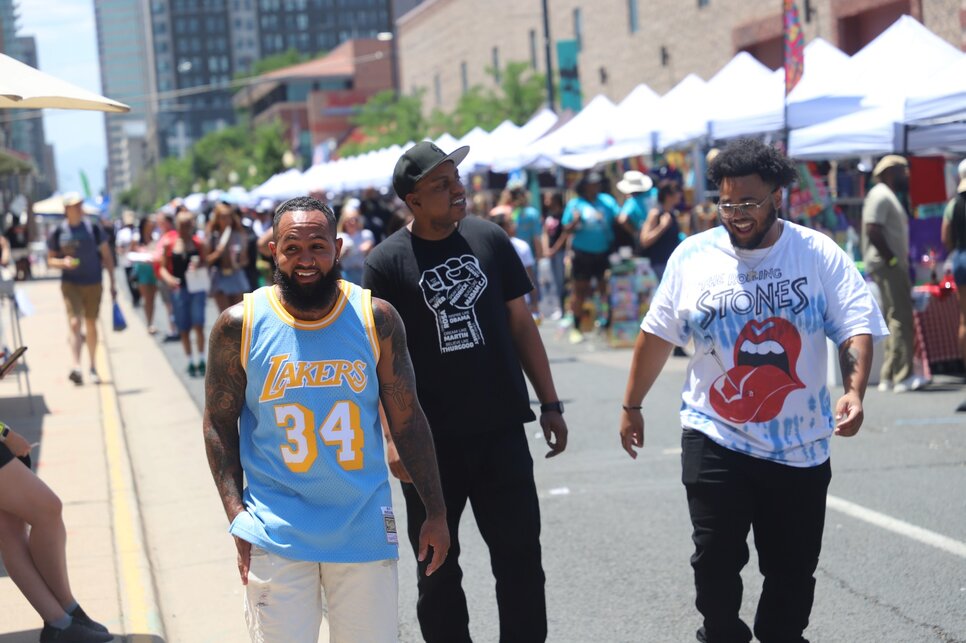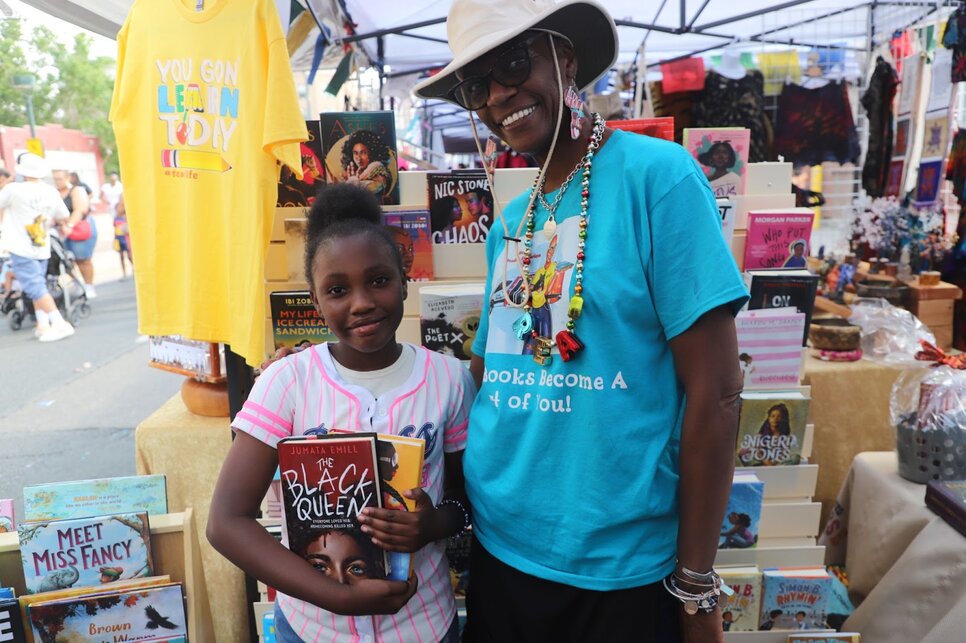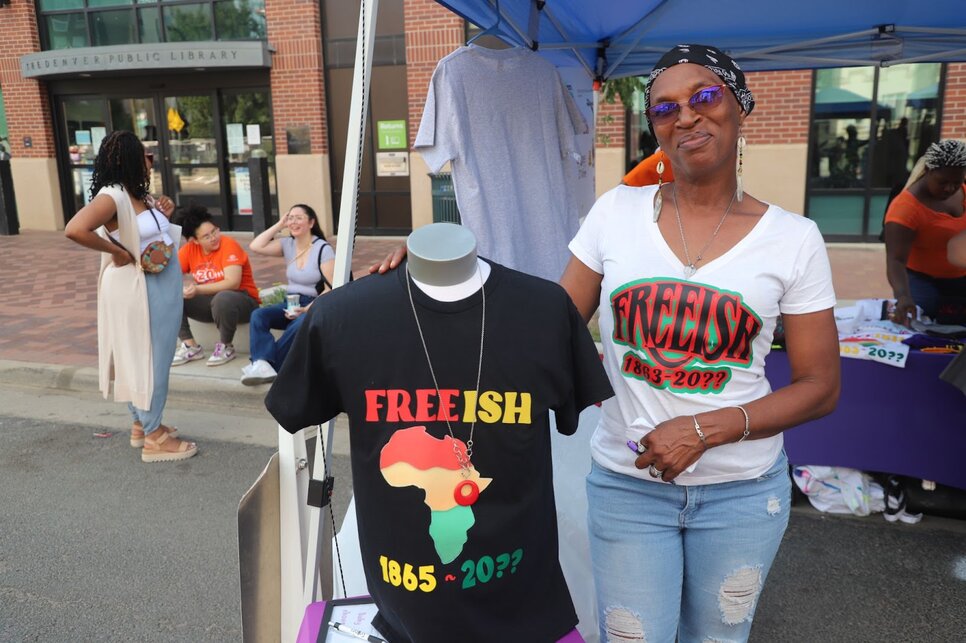Juneteenth celebration upholds ‘crown jewel’ of Black culture in Denver
share

DENVER — Norman Harris surveyed with pride as Black chefs at NOLA Eats spooned fried catfish onto paper plates. A DJ blared Nas’ “If I Ruled the World” on one side of Welton Street and a choir harmonized atop a stage on the other. All happened in celebration of Five Points’ annual weekend-long Juneteenth Music Festival.
In his 13th year as the executive director of the Juneteenth Music Festival, Harris has seen the event grow from hundreds to thousands of participants. He also led Denver’s celebration after President Joe Biden declared June 19 a national holiday in 2021.
“Denver’s Juneteenth has been a cultural anchor of our city since the 1950s,” Harris said. “It’s about bringing people together for good food, music and education.”
Juneteenth commemorates the day the Union army arrived in Galveston, Texas announcing that all enslaved Black people in the state were free in accordance with President Abraham Lincoln’s Emancipation Proclamation, which had been issued two years prior.
That day became a holiday celebrated mostly by Black people in the South until it became a federal holiday three years ago.
The Denver celebration is held in Five Points – a historically Black neighborhood once known as the “Harlem of the West.”
Harris, a fifth-generation Coloradan, said his older family members share stories of Five Points in the 1950s and 1960s as a thriving hot spot for community events, restaurants, and Black musicians, including Miles Davis and Ella Fitzgerald.

Gentrification has plagued the area as demands for housing have exceeded supply and costs have skyrocketed. But for Harris, Five Points will always be the crown jewel of Denver’s Black community. And as long as he’s in charge, Juneteenth will be celebrated along Welton Street in the heart of Five Points.
“Unfortunately, there's been quite a bit of involuntary displacement that has been the byproduct of gentrification,” Harris said. “But Juneteenth is a good reminder of what once was and, to a degree, what still is.”
Food trucks, community groups and vendors lined Welton Street between 24th and 29th Streets the weekend ahead of June 19.
Independent clothing designers displayed silky, colorful shirts and hats with catchy slogans and personalized designs. Artists showed off paintings of iconic Black musicians such as Bob Marley and The Notorious B.I.G.
Jordan Lujan, the owner of Freedom Credit Repair Budgeting, and Jason Woods, a realtor at Worth Clark Realty, felt their contributions helping mostly-Black festival attendees build wealth and buy properties were crucial.
“A lot of times, in other races, people’s parents teach them about personal finance,” Woods said. “A lot of Black folks don’t have that foundation and that knowledge so we’re just kind of left out in the cold.”
Woods and Lujan — both generations-long Denverites — help Black community members increase their credit scores and buy property to maintain their presence in the city.
Their businesses were two of several in the “First Time Homebuyer Zone,” a sectioned off area of the festival with information for visitors interested in purchasing property.
A 2023 report from the Colorado Association of Realtors found Black homeownership in Denver is at 42%, compared to 55% Hispanic, 67% Asian and 70% white.
Woods said making homeownership accessible to Black residents is essential, as systemic inequities such as redlining have historically excluded them from building home equity and passing on wealth to future generations.
“A lot of other Black folks think home-ownership is unattainable, and that is by design,” Woods said. “We want to give them an asset that they can pass down to future generations and really take advantage of the American Dream.”
A map from 1938 published by the Denver Public Library shows how lenders ranked neighborhoods from A to D based on desirability. Neighborhoods higher on the desirability scale – such as University Hills and Country Club — excluded people of color through zoning — a practice known as redlining. Neighborhoods lower on the desirability scale such as Barnum and Sun Valley have higher rates of poverty in 2024, according to a report from the Denver Housing Authority.
Lujan sees helping people understand and build their credit scores as his personal contribution to reversing that history and ongoing gentrification by giving Black residents tools to remain in Denver.
“We feel like there are a lot of barriers holding us back from the same opportunities others have,” Lujan said. “And we’re just trying to get people over the threshold and reverse the trends of displacement.”
Other vendors used the festival as an educational opportunity about Black culture and joy.
Sandra Guilford, a retired teacher and librarian with Denver Public Schools, set up her mobile book shop “Ms G’s Reading Emporium,” with books including coming-of-age novels, science fiction books and comics. The genres span through time and topics, but Guilford maintains one theme throughout: positive, inspiring stories where Black kids get to see themselves represented.
“When I was a librarian, I used to have kids come in and say ‘why don’t we have any books about Black girls?” Guilford said. “There’s nothing like having books where the characters look like you and their experiences sound like yours.”

Sandra Guilford celebrates books for Black children.
Photo: Alison Berg, Rocky Mountain PBS
Photo: Alison Berg, Rocky Mountain PBS
Guilford said national efforts to ban books and attacks on diversity have inspired her to grow her book shop and get books in front of larger audiences.
“We used to be a melting pot, now everyone is so afraid of diversity and obsessed with individuality,” Guilford said. “Kids get enough of the negativity. They see it on TV and in the news. If they see just a little bit of positivity, I think it can really change a kid’s life.”
“We used to be a melting pot, now everyone is so afraid of diversity and obsessed with individuality,” Guilford said. “Kids get enough of the negativity. They see it on TV and in the news. If they see just a little bit of positivity, I think it can really change a kid’s life.”
Donna Knight, who owns t-shirt company Grapes From D’Vine, sold t-shirts celebrating Jesus Christ and Black rights. Her designs included a white shirt with teal letters that read “Half Hood, Half Holy; Take it up with Jesus, Not Me,” and “In God We Trust. Everyone Else, Hands Where I Can See Them.”
But Knight’s most popular design is a Black t-shirt with red and yellow block letters stating “FREEISH: 1865-20??”

Donna Knight, t-shirt designer and owner of Grapes From D’Vine sports two t-shirts sending a message about Black liberation.
Photo: Alison Berg, Rocky Mountain PBS
Photo: Alison Berg, Rocky Mountain PBS
“The 20 with question marks represents the fact that we, as Black people, are not yet completely free,” Knight said. “We are still fighting for rights, we are still fighting for our lives, we are still fighting to get into places and positions.”
Knight hopes to design another t-shirt with the year in her lifetime that her community has “total freedom.”
“Total freedom, to me, includes me and my children and their children not having to worry about the police shooting them on sight because of the color of their skin,” Knight said. “We’re still waiting and we don’t know when we’re going to get it, but I’m hopeful for my lifetime. I want to cross out that question mark and have a date.”